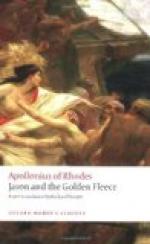Thus he spake, and they straightway built up an altar with shingle; and over the island they wandered, seeking if haply they could get a glimpse of a fawn or a wild goat, that often seek their pasture in the deep wood. And for them Leto’s son provided a quarry; and with pious rites they wrapped in fat the thigh bones of them all and burnt them on the sacred altar, celebrating Apollo, Lord of Dawn. And round the burning sacrifice they set up a broad dancing-ring, singing, “All hail, fair god of healing, Phoebus, all hail,” and with them Oeagrus’ goodly son began a clear lay on his Bistonian lyre; how once beneath the rocky ridge of Parnassus he slew with his bow the monster Delphyne, he, still young and beardless, still rejoicing in his long tresses. Mayst thou be gracious! Ever, O king, be thy locks unshorn, ever unravaged; for so is it right. And none but Leto, daughter of Coeus, strokes them with her dear hands. And often the Corycian nymphs, daughters of Pleistus, took up the cheering strain crying “Healer”; hence arose this lovely refrain of the hymn to Phoebus.
Now when they had celebrated him with dance and song they took an oath with holy libations, that they would ever help each other with concord of heart, touching the sacrifice as they swore; and even now there stands there a temple to gracious Concord, which the heroes themselves reared, paying honour at that time to the glorious goddess.
Now when the third morning came, with a fresh west wind they left the lofty island. Next, on the opposite side they saw and passed the mouth of the river Sangarius and the fertile land of the Mariandyni, and the stream of Lycus and the Anthemoeisian lake; and beneath the breeze the ropes and all the tackling quivered as they sped onward. During the night the wind ceased and at dawn they gladly reached the haven of the Acherusian headland. It rises aloft with steep cliffs, looking towards the Bithynian sea; and beneath it smooth rocks, ever washed by the sea, stand rooted firm; and round them the wave rolls and thunders loud, but above, wide-spreading plane trees grow on the topmost point. And from it towards the land a hollow glen slopes gradually away, where there is a cave of Hades overarched by wood and rocks. From here an icy breath, unceasingly issuing from the chill recess, ever forms a glistening rime which melts again beneath the midday sun. And never does silence hold that grim headland, but there is a continual murmur from the sounding sea and the leaves that quiver in the winds from the cave. And here is the outfall of the river Acheron which bursts its way through the headland and falls into the Eastern sea, and a hollow ravine brings it down from above. In after times the Nisaean Megarians named it Sooenautes[1] when they were about to settle in the land of the Mariandyni. For indeed the river saved them with their ships when they were caught in a violent tempest. By this way the heroes took the ship through[2] the Acherusian headland and came to land over against it as the wind had just ceased.




